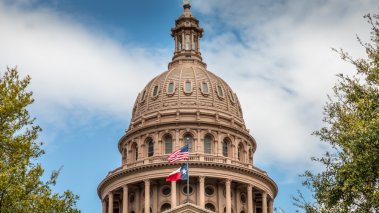Table of Contents
New Texas bill could diminish or eliminate tenure protections, jeopardizing academic freedom.

Martina Birnbaum / Shutterstock.com
Texas state capitol building in Austin.
UPDATED (May 31, 2023): On May 27, the Texas State Senate voted to accept the House’s version of Senate Bill 18. After FIRE voiced opposition to this bill, the House attempted to clarify the vague language related to the property interest attached to tenure. The legislation now reads, “granting of tenure may not be construed to create a property interest in any attribute of a faculty position beyond a faculty member’s continuing employment, including his or her regular annual salary and any privileges incident to his or her status as a tenured professor.” This language remains unclear in its effect and we remain concerned that this provision reduces the cost of improperly terminating tenured faculty.
While FIRE is thankful that tenure will be preserved at Texas’ public institutions of higher education, SB 18 still substantially weakens tenure. The lack of sufficient due process protections and ability for administrators to terminate tenured professors for “unprofessional conduct that adversely affects the institution” mean the legislation and the policies it mandates are ripe for abuse. Should Governor Greg Abbott sign the bill into law, as he is expected to do, FIRE will monitor how institutions implement the new tenure policy and stands ready to assist any professor whose First Amendment or academic freedom rights are violated.
Faculty members cannot properly work towards advancing and disseminating knowledge if they fear termination because of their speech, publications, or research findings. Tenure — defined by the AAUP as an indefinite appointment terminable “only for cause or under extraordinary circumstances” — is often the most common tool universities use to forestall incursions on academic freedom. Removing tenure, therefore, without replacing it with other substantive and procedural academic freedom protections, is likely to lead to rampant censorship of academics from across the political spectrum.
Yet legislators in the Lone Star State are on the verge of fundamentally diminishing tenure for all Texas public university faculty. As passed by the state Senate, Senate Bill 18, introduced earlier this year, would establish that: “An institution of higher education may not grant an employee of the institution tenure or any type of permanent employment status.” Texas senators voted to send this language to the House.
Tenure has been central to defending academic freedom because it shields faculty from institutional repercussions for their scholarship, teaching, research, or opinions, especially when they have disfavored or dissenting viewpoints.
Last week, a substitute version was offered that doesn’t ban tenure, but still rolls it back in several problematic ways. The House Committee on Higher Education then heard hours of testimony last Monday, all opposed to SB 18, but disappointingly voted 6-5 on the ensuing Friday to advance the substitute version of the legislation.
We’ll break down both the House and Senate versions, as both threaten academic freedom and contain elements that could be incorporated in a potential conference committee compromise bill.
The Senate’s version
In a March 10 press release announcing the Senate bill, Senator Brandon Creighton, its primary sponsor, claimed that SB 18 “eliminates the costly, unnecessary and antiquated burden of tenure at Texas public colleges and universities.”
FIRE does not take a position on whether tenure is the best way to protect academic freedom or on the merits of post-tenure review. It may be possible for legislators to provide alternative academic freedom protections that might be even better. We also understand lawmakers want to ensure the prudent use of public dollars spent on higher education to the benefit of enrolled students and the state. Still, tenure has been central to defending academic freedom because it shields faculty from institutional repercussions for their scholarship, teaching, research, or opinions, especially when they have disfavored or dissenting viewpoints. We, therefore, oppose efforts to end or weaken tenure, unless it’s replaced by robust statutory academic freedom and procedural protections.
While the senate version of SB 18 in removing tenure leaves open the possibility for the board of regents to devise an alternative method of tiered employment and evaluating faculty performance, the bill itself fails to provide any substantive academic freedom rights for professors – let alone any commensurate with the protections tenure offers. It simply provides that:
This section does not prohibit the board of regents of an institution of higher education from establishing an alternate system of tiered employment status for faculty members provided that the system clearly defines each position and requires each faculty member to undergo an annual performance evaluation.
This falls well shy of guaranteeing faculty academic freedom.
The House’s version
The House’s committee substitute, while a slight improvement over the Senate’s version of SB 18, would still imprudently weaken faculty rights and academic freedom protections for faculty employed in the state’s public institutions of higher education.
Unlike the Senate’s version, the House’s SB 18 substitute does not explicitly ban tenure “or any type of permanent employment status.” Instead, it alters the current tenure-granting system in Texas and, if enacted, will weaken tenure protections in the state.
The House substitute affords the governing boards of each institution exclusive authority to grant tenure. It states, “Only an institution of higher education’s governing board, on the recommendation of the institution’s chief executive officer and the university system’s chancellor, if applicable, may grant tenure.”
And although the House’s substitute bill mentions due process several times, it offers no explicit protections for faculty members undergoing a tenure removal process.
This change weakens tenure protections because, in Texas, public university presidents are appointed by the Board of Regents, whose members are themselves political appointees of the governor. Such a regime is likely to invite political considerations into post-tenure review. While we don't take a position on any precise tenure-granting mechanism, the proposal should incorporate faculty involvement in the process, even if it is just to advise the university’s governing board.
The House substitute also includes a provision that limits the effects of tenure, through vague language to the effect that “granting of tenure may not be construed to create a property interest in any attribute of a faculty position beyond a faculty member’s regular annual salary.” This can be read in at least two ways: It could mean potential damages for improperly terminating a tenured professor are capped at one year of the professor’s salary. Or, it could mean courts may not assess damages in those cases for loss of other benefits, like medical coverage, anticipated retirement benefits, or reputational damage. Either interpretation incentivizes administrators to fire tenured faculty by reducing the cost of improperly doing so.

Is the sun setting on free expression and academic freedom in Florida?
News
Ninety percent of targeted scholars at the University of Florida face punishment.
Another serious problem with the House’s substitute bill is it allows firing tenured faculty “at any time” if found to have engaged in “unprofessional conduct.” The concept of “professionalism,” like “civility,” is so malleable it can be easily abused and used as a pretext to remove tenure on viewpoint-based grounds. In fact, universities often initiate grievance proceedings against faculty based on claims that their underlying behavior was “unprofessional,” even if the conduct is clearly protected by academic freedom and the First Amendment. (Universities have frequently used similarly vague rules as a pretense for disciplinary proceedings against non-tenured faculty who cause controversy.)
And although the House’s substitute bill mentions due process several times, it offers no explicit protections for faculty members undergoing a tenure removal process, aside from the bare minimal requirement of being offered notice of the allegations against them and some opportunity to contest them. For example, nowhere does the bill guarantee the right to counsel for faculty going through disciplinary procedures. Nor does it provide faculty any opportunity to meaningfully cross-examine accusers. The bill does not even require the institution to turn over any evidence in its possession. These omissions are glaring.
Further, any policy that allows administrators to remove a tenured professor must require institutions to offer a meaningful appeal, yet the House substitute does not describe the precise process through which faculty may dispute the university’s findings, allowing the institutions to decide whether, and in what form, appeals will take place.
A silver lining in the House’s substitute bill is that while tenure could be stripped for cause, in most situations, tenured faculty would first be entitled to a performance improvement plan. The bill states: “for a faculty member who receives an unsatisfactory rating in any area of any evaluation conducted under this section, the evaluation process [must] provide for a short-term development plan that includes performance benchmarks for returning to satisfactory performance.” This provision gives faculty an opportunity to correct any alleged shortcomings. However, the performance “benchmarks” could also be misused to infringe faculty’s academic freedom.
Why Texas should reject both versions of SB 18
Both the Senate’s version and the House’s version of SB 18 fail to adequately protect academic freedom and free speech rights. As FIRE’s years of work defending faculty rights demonstrate, removing tenure without providing alternative substantive and procedural academic freedom protections will lead to rampant censorship of academics from across the political spectrum. And inviting pretextual open-ended charges under the guise of “unprofessionalism” poses a similar threat.

REPORT: Scholars punished for their speech skyrocketed over last three years
Press Release
A new report from FIRE finds that attempts to punish college and university scholars for their speech skyrocketed over the past two decades, from only four in 2000 to 145 in 2022.
Last month, we released our “Scholars Under Fire” report, which “examines the nature of attempts to professionally sanction scholars, from 2000 to 2022, for speech that is — or would, in public settings, be — protected by the First Amendment.”
The report details an alarming increase in scholars targeted for their views over the past three years. The number of scholars punished in the past three years (509) nearly matches the number of scholars sanctioned in the 20 years prior to 2020 (571). We registered a total of 1,080 sanction attempts over the past twenty three years.
This trend is concerning, and it underscores the continued importance of academic freedom protections in an environment where that freedom is so often threatened. We will continue to work to ensure faculty receive the necessary protections to speak and conduct research on matters of public concern without fear of sanction or dismissal for their protected expression.
FIRE urges Texas legislators to vote against any version of SB 18 that does not adequately protect academic freedom.
If you’re a professor at a public college or university and face a threat of sanction, or have been sanctioned, by your institution for expressive activity, please submit your case to FIRE’s Faculty Legal Defense Fund for consideration.
Recent Articles
FIRE’s award-winning Newsdesk covers the free speech news you need to stay informed.

Texas tramples First Amendment rights with police crackdown of pro-Palestinian protests

Here’s what students need to know about protesting on campus right now

Kansas takes a stand for intellectual freedom


